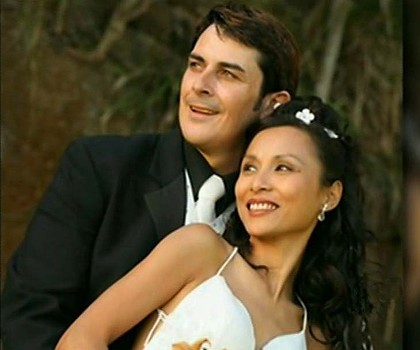
Mark and Jocelyn Edwards. Photo: Channel Nine
A woman has been granted access to her dead husband's sperm to conceive a child.
A WIDOW's quest to have her dead husband's baby will head interstate or overseas after a New South Wales court found that while his sperm was her ''property'', state laws prohibited her from using it to conceive a child.
Jocelyn Edwards will be allowed to remove from storage at IVF Australia three ''straws'' of frozen sperm extracted from her husband Mark in the hours after his death in a workplace accident last year.
But she will have to convince an infertility clinic in the ACT or Queensland to impregnate her because Mr Edwards did not sign a written consent before he died.

Mark and Jocelyn Edwards. Photo: Channel Nine
Under the NSW Assisted Reproductive Technology Act, sperm cannot be used unless the donor has consented to posthumous use.
Ms Edwards, 40, and Mr Edwards, 39, were due to sign consent forms to start IVF treatment the day after he died on August 5, 2010. Hours after his death, Ms Edwards won a court order to allow his sperm to be harvested and frozen.
Yesterday, Justice Robert Allan Hulme in the Supreme Court granted Ms Edwards ownership of the sperm. He considered whether his ruling would ''involve the turning of a blind eye'' to actions that were contrary to NSW law.
But he accepted Ms Edwards's claim that on Valentine's Day 2009, her husband said: ''If something happens to me I would want a part of me to be here with you … please promise me you will still have our baby.''
But ultimately, it would be up to the fertility clinic that Ms Edwards approached for treatment to decide if Mr Edwards intended for his sperm to be used after his death.
The Medical Director of IVF Australia, Peter Illingworth, said he hoped an interstate service would be ''brave'' enough to fulfil Ms Edwards's wish. ''This is an exceptional case because there is such strong inferential evidence of their intent to have children,'' Professor Illingworth said.
The chairwoman of the Australian Health Ethics Committee, Sandra Hacker, said states without assisted reproduction laws relied on federal ethical guidelines, which require ''clearly expressed and witnessed'' consent, but not written consent.
Outside court in Parramatta, Ms Edwards said she was prepared to go to another jurisdiction. ''We're going to have our baby, that's what I plan to do, yes,'' she said.